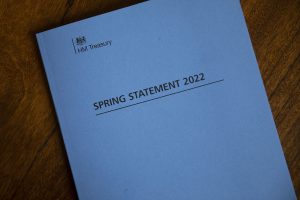Chancellor promises change, but not yet

Chancellor Rishi Sunak’s Spring Statement set the direction of travel for fiscal policy for the rest of the Parliament but future measures overshadowed actions being taken now.

Sunak also set out “three priorities for this autumn” around people, capital and ideas. He talked of “a new culture of enterprise” with final decisions to be announced in the Autumn Budget, including the reform of R&D tax credits, and considering cutting the tax rates on business investment.
In the 28-minute statement, Sunak sought to address the cost of living crisis and ease pressure from critics about the incoming rise in National Insurance.
He increased the National Insurance contributions threshold by £3,000 “to fully equalise the NICs and income tax threshold”, from this July to £12,570.
Sunak said the “£6bn personal tax cut” would benefit 30m people and see 70% of people benefit once the increase and the threshold changes are combined.
The Chancellor also set out a trio of targeted measures – a 5p-per-litre cut in fuel duty until next March, zero-rating VAT on energy efficiency investments by homeowners on items such as a solar panel set, and doubling the household support fund to £1bn.
The measures were met by a clear “is that it?” heckle from the opposition benches.

Credit: HM Treasury / Flickr
He was delivering his Spring Statement against a challenging economic backdrop – this morning inflation revealed to have increased to 6.2% in February, the highest rate for 30 years – and a volatile geopolitical situation caused by Russia’s invasion of Ukraine.
“The actions we have taken to sanction Putin’s regime are not cost free for us,” said Sunak.
“There is unusually high uncertainty around the outlook. It is too early to know the full impact of the trade war on the UK economy. ”
He revealed updated forecasts from the Office for Budget Responsibility that set out GDP expectations of 3.8% this year, before falling away to 1.8% next year than 2.1%, 1.8% and 1.7% in the following years.

“As predicted, the health and social care levy increase to NIC will go ahead but softened by an increase in the NIC threshold, which will help working families. In the biggest fuel duty cut ever, a reduction of 5p per litre will take effect from 6pm today and there is more targeted support on energy costs via the Household Support Fund.
“This was a quiet speech for businesses and many of our clients will be disappointed that certainty on existing tax reliefs or further help on rising costs wasn’t addressed. But more is expected in the Autumn with a promised consultation on how tax relief can support business investment and encourage innovation. And just ahead of the next election, we are promised a 1p cut in income tax. All in all, there was a sense today that the Chancellor would have liked to go further in some areas but with the conflict in Ukraine, spiralling inflation and uncertainty warnings from the OBR, perhaps today was not the day.”









